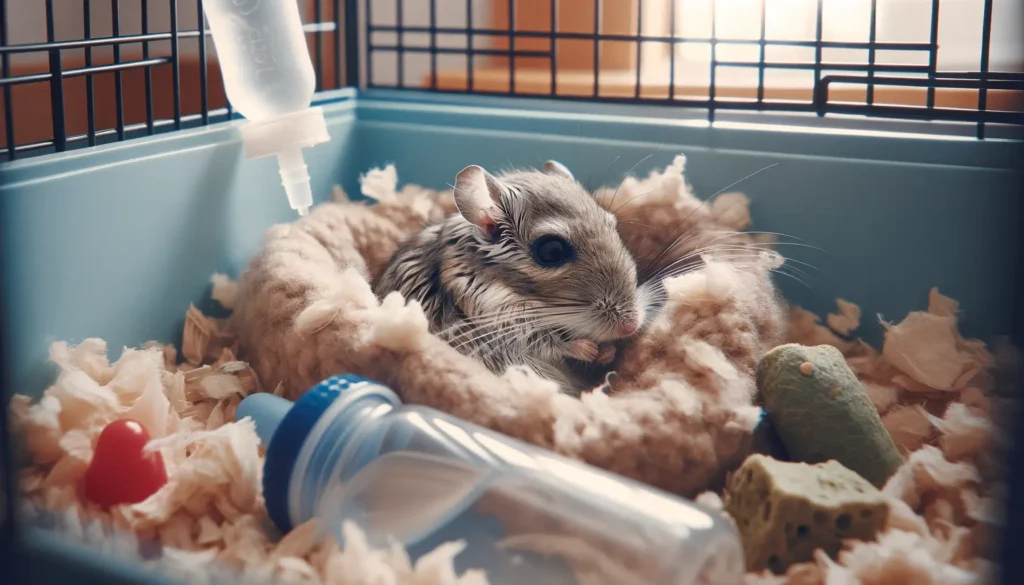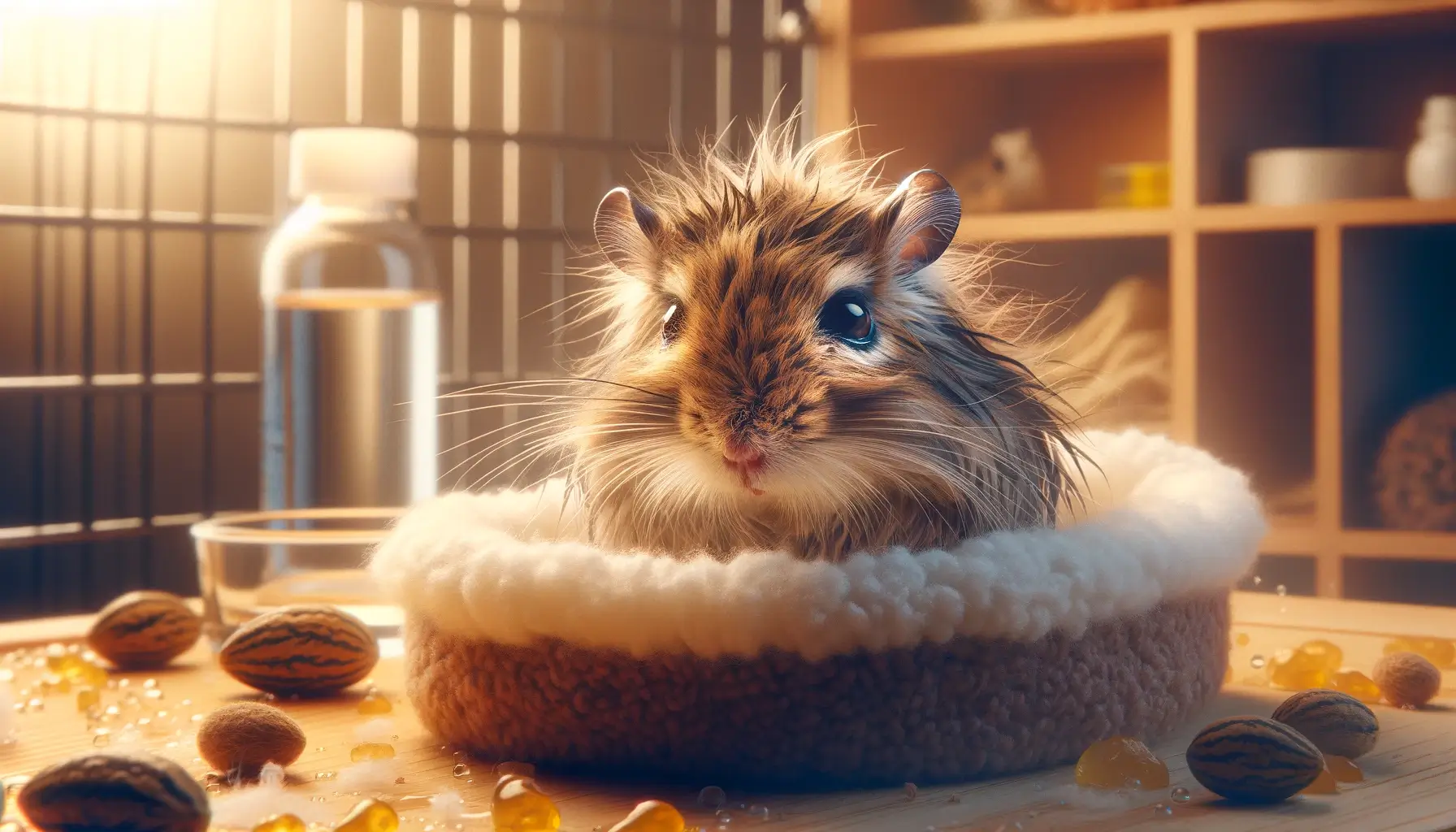Gerbils, with their playful nature and adorable antics, make for delightful pets. However, like all living beings, they are susceptible to various health issues, one of the most concerning being respiratory infections.
These infections can quickly escalate from mild discomfort to life-threatening conditions if not addressed promptly. Recognizing the signs early and seeking timely treatment is crucial for the well-being of your furry friend.
In this article we will discuss how to identify respiratory infection in gerbils, how to respond and treat this disease.
Recognizing Respiratory Infections in Gerbils
- Clicking Noise: One of the earliest signs of a respiratory infection in gerbils is a distinctive clicking noise during breathing, caused by mucus obstructing the airways.
- Wheezing: Obstructed nose and throat can lead to heavy, wheezing breaths as air whistles through narrowed passages.
- Coughing and Sneezing: To clear blocked airways, gerbils may cough and sneeze, actions that, while helpful, can also spread the infection.
- Runny Nose and Eyes: Similar to human cold symptoms, gerbils may exhibit runny noses and watery eyes due to excessive mucus production.
- Changes in Behavior: Infected gerbils often show decreased activity levels, altered sleeping patterns, and a loss of appetite, indicating discomfort and energy conservation.
When to Seek Veterinary Care?
It’s imperative to consult a veterinarian at the first sign of any respiratory distress in your gerbil. Early intervention can prevent the progression of the infection and reduce the risk of severe complications. A professional diagnosis is essential to determine the appropriate course of treatment.
Veterinary Care and Diagnosis
Upon observing symptoms indicative of a respiratory infection, a visit to the vet is non-negotiable. Respiratory infections in gerbils can stem from various causes, including bacteria, viruses, or environmental factors, and only a qualified veterinarian can accurately diagnose and prescribe the correct antibiotics.
The Role of the Veterinarian:
A veterinarian will conduct a thorough examination of your gerbil, which may include listening to its breathing, evaluating symptoms, and possibly recommending diagnostic tests. This comprehensive approach ensures that the treatment plan is tailored to your gerbil’s specific needs.
Why Antibiotics Are Necessary?
Antibiotics play a crucial role in combating bacterial respiratory infections. They work by targeting and eliminating the bacteria responsible for the infection, thereby alleviating symptoms and preventing further health deterioration.
It’s crucial to remember that antibiotics only work against illnesses caused by bacteria; they cannot treat viral infections. Your vet will decide if antibiotics are suitable for your gerbil’s condition and will instruct you on the proper administration method to ensure a swift recovery.
How to Treat Gerbil Respiratory Infection in Gerbils?

When your gerbil is diagnosed with a respiratory infection, understanding the treatment process is crucial for a speedy recovery. Antibiotics are typically the frontline treatment for bacterial infections, but the care you provide at home plays a significant role in your pet’s recovery.
Administering Antibiotics:
Your vet will prescribe specific antibiotics to combat the infection. These medications are usually in liquid form, requiring careful administration with a syringe. Here’s how to ensure your gerbil gets the full benefit:
- Preparation: Fill the syringe with the prescribed dose of antibiotics. If your vet provides pre-filled syringes, you’re one step ahead.
- Handling: Gently hold your gerbil, ensuring it feels secure but not restrained.
- Administration: Position the syringe at the corner of your gerbil’s mouth, gently introducing the syringe tip. Slowly release the medication, allowing your pet to swallow it.
- Patience and Persistence: Some gerbils may resist taking their medicine. Remain calm and patient, using gentle reassurance to soothe your pet.
Creating a Comfortable Environment:
The environment you provide for your sick gerbil can significantly affect its recovery. Ensure the cage is clean, well-ventilated, and kept at a comfortable temperature. Avoid using pine or cedar shavings as bedding, as these can irritate respiratory conditions. Opt for paper-based bedding instead.
Isolation to Prevent Spread:
Respiratory infections can spread quickly among gerbils. Isolate the infected gerbil in a separate enclosure to prevent the illness from spreading to cage mates. This also allows the sick gerbil to rest without the stress of social interactions.
Also read: Do Gerbils Get Wet Tail?
Home Care and Monitoring
While antibiotics work to fight the infection, supportive care at home is essential for your gerbil’s recovery.
- Hydration and Nutrition: Ensure your gerbil has access to fresh water and a balanced diet. Sick gerbils might lose their appetite, so offering favorite treats can encourage eating.
- Monitoring: Keep a close eye on your gerbil’s symptoms, appetite, and activity level. Any signs of deterioration should prompt a call to your vet.
- Comfort: Provide a warm, quiet space for your gerbil to rest. A gentle heat source, like a heated pad set on low under part of the cage, can help, but ensure there’s space for your gerbil to move away if it gets too warm.
Prevention Strategies For Respiratory Infection
Preventing respiratory infections is key to ensuring the long-term health and happiness of your gerbil.
Cage Cleanliness and Maintenance:
Regular cleaning of your gerbil’s cage is paramount. Remove soiled bedding daily, and perform a thorough clean weekly. This reduces the risk of infections and keeps the environment fresh and healthy.
Avoiding Common Irritants:
Dust from certain types of bedding and airborne irritants can contribute to respiratory issues. Opt for dust-free bedding and keep the cage in a well-ventilated area away from strong scents and drafts.
Regular Health Checks:
Frequent interaction and observation allow you to catch early signs of illness. Regular, gentle handling not only strengthens your bond with your gerbil but also enables you to notice any changes in its health or behavior.
FAQs
Can Gerbil Respiratory Infections Spread to Humans or Other Pets?
Gerbil respiratory infections are typically specific to rodents and are caused by bacteria or viruses that do not usually infect humans. However, maintaining good hygiene practices, such as washing your hands before and after handling your pets, is crucial to prevent any cross-species transmission risks.
Other household pets, like cats or dogs, are generally not at risk from gerbil respiratory infections, but it’s always wise to monitor all your pets’ health closely.
How Long Does It Take for a Gerbil to Recover from a Respiratory Infection?
The recovery time can vary depending on the severity of the infection and how quickly treatment was initiated. With prompt antibiotic treatment and proper care, many gerbils start to show improvement within a few days to a week. However, it’s essential to complete the entire course of antibiotics as prescribed by your vet to ensure a full recovery and prevent relapse.
Can I Prevent Respiratory Infections with Dietary Supplements or Vitamins?
While there’s no guaranteed way to prevent respiratory infections through diet alone, ensuring your gerbil has a balanced and nutritious diet can support its overall health and immune system. Supplements and vitamins should only be given based on a veterinarian’s recommendation to avoid potential health issues from over-supplementation.
Conclusion
Gerbil respiratory infections, while concerning, are treatable conditions that require prompt and attentive care. Recognizing the signs early, consulting with a veterinarian for an accurate diagnosis and treatment plan, and providing a supportive home environment are key steps in helping your gerbil recover.
Prevention, through regular cage cleaning, avoiding irritants, and maintaining a healthy diet, plays a crucial role in keeping your gerbil healthy.
Remember, your gerbil relies on you for its well-being. By staying informed, observant, and proactive in your gerbil’s care, you can ensure a swift recovery from respiratory infections and a happy, healthy life for your furry friend.
Your dedication to your gerbil’s health not only enhances its quality of life but also strengthens the bond you share with your pet.











